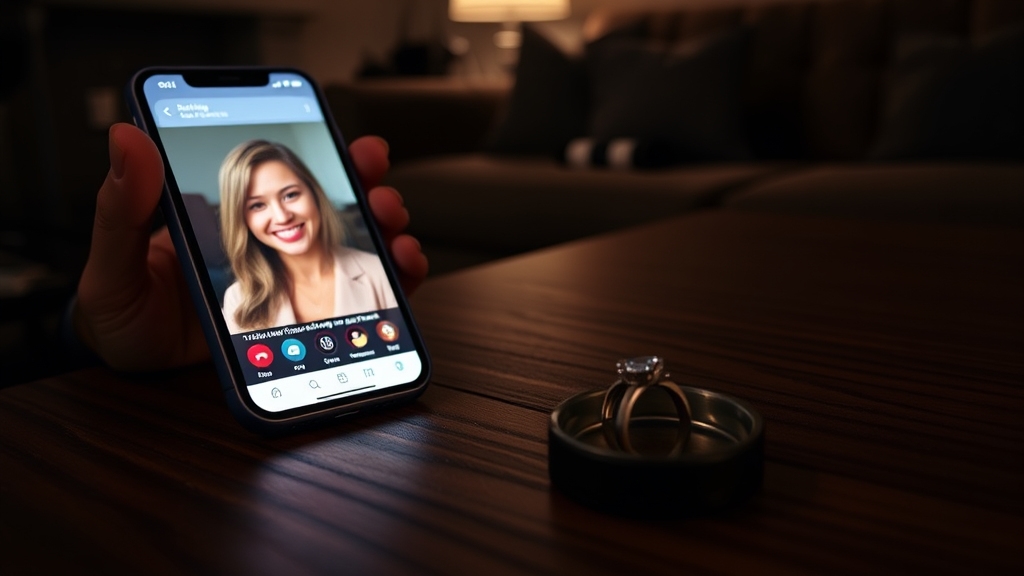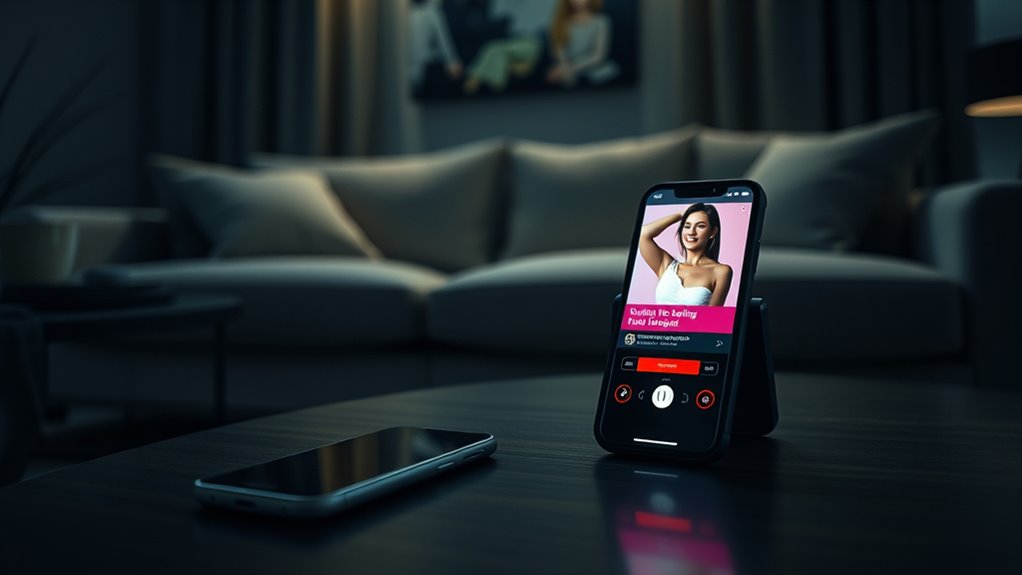Using dating apps while married often means you’re seeking validation, emotional connection, or a way to escape feelings of neglect or dissatisfaction at home. These impulsive choices are driven by unmet needs and emotional triggers like longing or vulnerability. However, they also carry privacy risks and threaten your relationship’s trust. If you want to understand what these actions truly reveal about your emotional state and how to address them, there’s more to contemplate.
Key Takeaways
- Many married individuals use dating apps to seek validation, emotional connection, or escape feelings of neglect in their marriage.
- Emotional triggers like loneliness or feeling undervalued often lead spouses to impulsively engage with these platforms.
- Privacy concerns and fear of exposure create a delicate balance between seeking connection and risking relationship damage.
- The accessibility of dating apps fosters impulsive decisions driven by momentary vulnerability, despite potential long-term consequences.
- Addressing underlying emotional needs internally can reduce reliance on risky online interactions and promote healthier relationship dynamics.

Have you ever wondered why some married people turn to dating apps? It’s a question that often comes with complex answers. For many, it’s not just about seeking new connections but about emotional triggers that pull them toward these platforms. When someone feels neglected, unappreciated, or disconnected in their marriage, they might turn to dating apps as a way to fulfill unmet emotional needs. These apps promise validation, excitement, and a sense of being desired—all things that may be missing from their current relationship. But beneath these motivations, there are significant concerns about privacy. Married individuals often worry about their personal information being exposed or their actions being discovered by their spouse. The fear of losing trust or facing the repercussions of privacy breaches can make engaging on these platforms a tense balancing act.
Married people turn to dating apps seeking validation and connection, while secretly balancing privacy fears and emotional needs.
As you navigate this territory, you might find yourself grappling with conflicting feelings. On one hand, the emotional triggers—like craving affection or affirmation—can feel overpowering. On the other, privacy concerns serve as a constant reminder of the risks involved. The desire for connection can tempt you to ignore the potential fallout, yet the awareness that your spouse might stumble upon your activities keeps you cautious. Many who seek out these apps do so in moments of vulnerability, hoping to temporarily fill a void. They might rationalize their actions, convincing themselves that it’s just curiosity or a fleeting need, but deep down, they know that crossing certain boundaries can threaten their marriage’s foundation. Moreover, the constant evolution of technology and digital platforms makes it easier to access these apps discreetly, increasing the temptation to act impulsively. The accessibility of these platforms can also exacerbate feelings of loneliness, especially when social interactions are limited or strained in real life.
The emotional triggers involved often stem from feelings of loneliness or dissatisfaction. When communication breaks down or intimacy wanes, it’s easy to feel invisible or undervalued, pushing you toward the allure of a digital escape. Additionally, the filtration systems in these apps can make interactions seem safer, encouraging more impulsive behavior. However, privacy concerns remain at the forefront. You constantly worry about being caught, about someone discovering your profile, or about the potential damage to your reputation if your actions come to light. This tension creates a paradox: the very platforms offering an outlet also impose the risk of exposure. That’s why many married people who explore dating apps do so in secret, weighing the emotional benefits against the potential consequences. Understanding these factors can help you recognize the importance of addressing underlying issues in your marriage rather than seeking quick fixes. Recognizing the role of diversification can also be useful in addressing emotional needs in healthier ways.
Ultimately, understanding why married people turn to these platforms reveals a lot about human needs and vulnerabilities. It’s a reminder that emotional triggers are powerful and that privacy concerns aren’t just about secrecy—they’re about protecting a fragile sense of stability. When these two forces collide, it can lead to impulsive decisions that might seem minor in the moment but have long-lasting repercussions. Recognizing this dynamic can help you reflect on your own emotional well-being and the importance of addressing issues within your marriage before they push you toward risky territory. Being aware of the emotional triggers and privacy concerns involved can foster healthier ways of coping and communicating within your relationship.
Frequently Asked Questions
How Common Are Married People Using Dating Apps Today?
You might be surprised, but many married people use dating apps today for casual dating or social experimentation. While exact numbers vary, studies suggest a significant portion engage in these platforms, often seeking new connections or exploring personal boundaries. You should be aware that this trend reflects changing attitudes toward relationships, where some see dating apps as a way to satisfy curiosity or spice up their social lives without necessarily intending to cheat.
What Motivates Married Individuals to Join Dating Apps?
You might wonder what motivates married individuals to join dating apps. Often, they seek emotional fulfillment or want to alleviate loneliness, especially if their relationship feels lacking in connection. Sometimes, they crave excitement or validation outside their marriage. These motivations drive them to explore new interactions, hoping to find the emotional support or companionship they’re missing, even if it complicates their existing commitments.
Are There Legal Consequences for Married People on Dating Platforms?
Coincidentally, engaging on dating platforms can lead to serious legal implications if you’re married. You might face consequences like divorce or custody disputes, especially if your actions breach prenuptial agreements or local laws. Privacy concerns also come into play, as personal data could be exposed or misused. It is crucial to understand that your online activity isn’t just private; it can have real-world legal and emotional repercussions.
How Do Couples Typically React if They Discover Infidelity via Apps?
When couples discover infidelity through apps, trust issues often deepen, causing emotional betrayal to surface. You might feel shocked, angry, or betrayed, leading to intense conversations or even breakups. Some partners choose to work through the issues, rebuilding trust, while others may end the relationship altogether. The emotional impact varies, but it’s clear that discovering infidelity through apps substantially challenges the foundation of trust and loyalty in a relationship.
What Psychological Effects Does Using Dating Apps Have on Married Users?
You might think dating apps boost confidence, but they often create trust issues, making you question your partner and even yourself. Ironically, seeking emotional validation online can lead to emotional dependency, leaving you more isolated. Using these apps can intensify feelings of insecurity and loneliness, eroding your mental well-being. Instead of connecting genuinely, you risk deepening psychological scars that may take years to heal.
Conclusion
As you scroll through the glowing screens, it’s easy to get caught in the allure of fleeting connections. But beneath the surface, those swipes ripple into quiet storms—trust unraveling like fragile threads. Remember, every tap shapes your story, painting a picture of choices made in shadows or light. In this digital dance, choose with intention, knowing that behind each swipe lies the potential to either rebuild trust or fracture it beyond repair.









